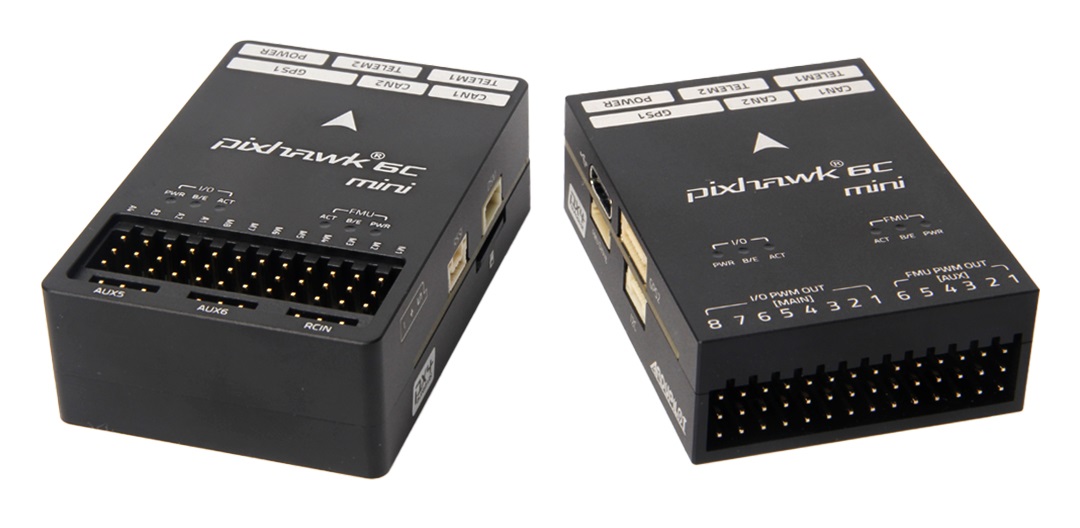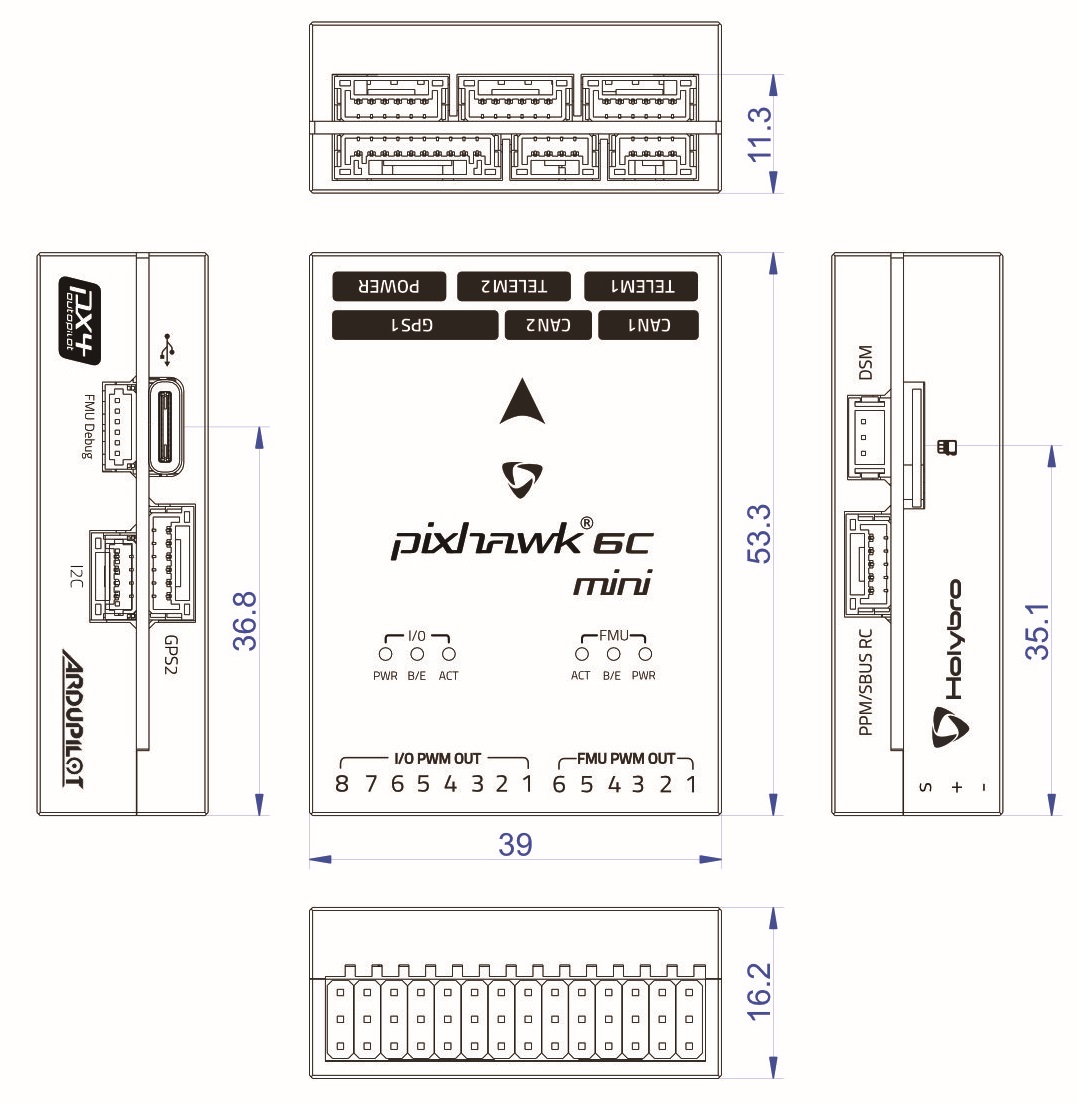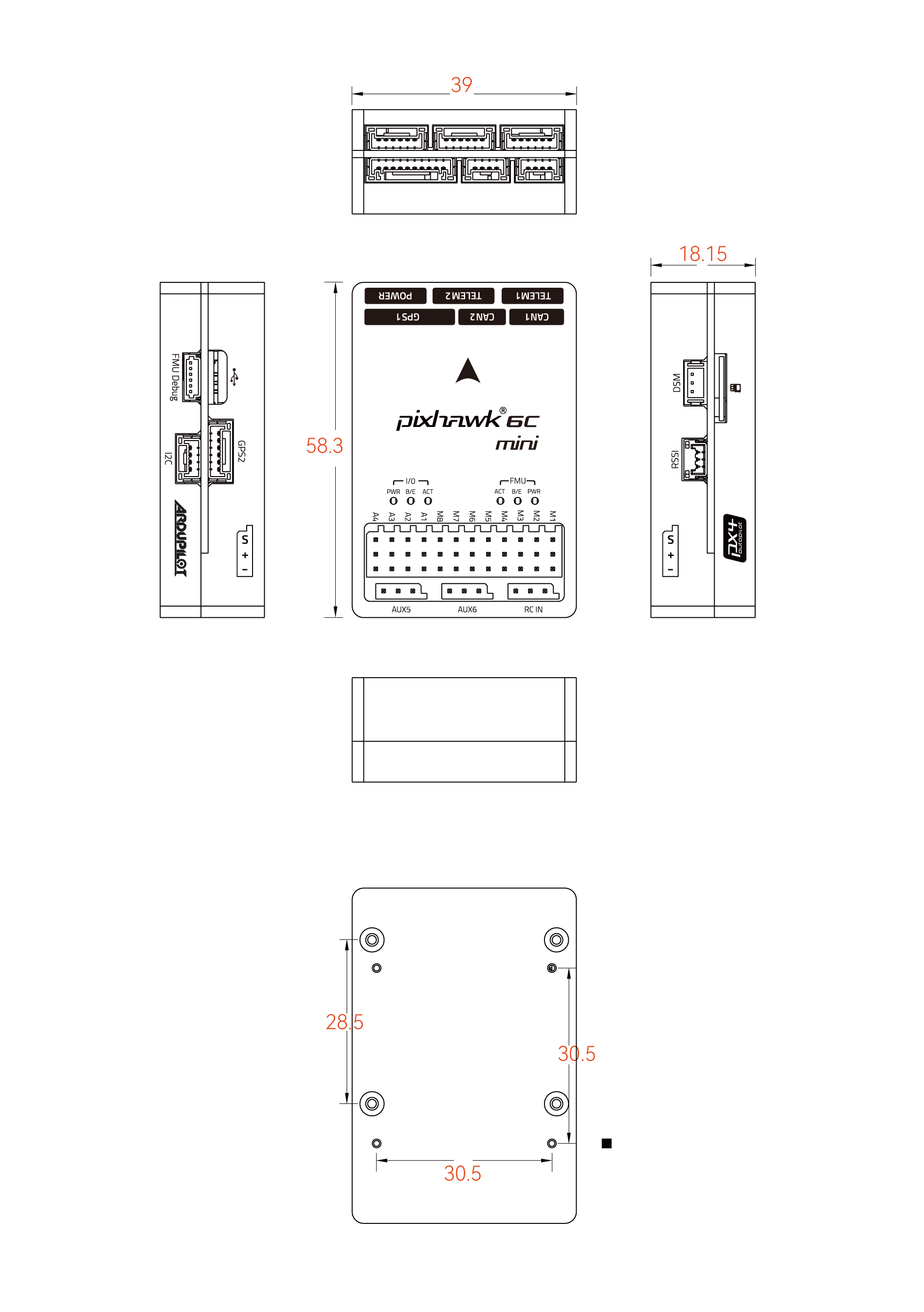Holybro Pixhawk 6C Mini
WARNING
PX4 does not manufacture this (or any) autopilot. Contact the manufacturer for hardware support or compliance issues.
Pixhawk 6C Mini® is the latest update to the successful family of Pixhawk® flight controllers designed and made in collaboration with Holybro® and the PX4 team.
It is equipped with a high performance H7 Processor and comes with IMU redundancy, temperature-controlled IMU board, and cost effective design, delivering incredible performance and reliability. It complies with the Pixhawk Connector Standard.

TIP
This autopilot is supported by the PX4 maintenance and test teams.
Introduction
The Pixhawk® 6C Mini is the latest update to the successful family of Pixhawk® flight controllers.
Inside the Pixhawk® 6C Mini, you can find an STMicroelectronics® based STM32H743, paired with sensor technology from Bosch® & InvenSense®, giving you flexibility and reliability for controlling any autonomous vehicle, suitable for both academic and commercial applications.
The Pixhawk® 6C Mini's H7 microcontroller contain the Arm® Cortex®-M7 core running up to 480 MHz, and has 2MB flash memory and 1MB RAM. Thanks to the updated processing power, developers can be more productive and efficient with their development work, allowing for complex algorithms and models.
The Pixhawk 6C Mini includes high-performance, low-noise IMUs on board, designed to be cost effective while having IMU redundancy. A vibration isolation System to filter out high-frequency vibration and reduce noise to ensure accurate readings, allowing vehicles to reach better overall flight performances.
The Pixhawk® 6C Mini is perfect for developers at corporate research labs, startups, academics (research, professors, students), and commercial applications.
Key Design Points
- High performance STM32H743 Processor with more computing power & RAM
- New cost-effective design with low-profile form factor
- Newly designed integrated vibration isolation system to filter out high frequency vibration and reduce noise to ensure accurate readings
- IMUs are temperature-controlled by onboard heating resistors, allowing optimum working temperature of IMUs
Technical Specification
Processors & Sensors
- FMU Processor: STM32H743
- 32 Bit Arm® Cortex®-M7, 480MHz, 2MB memory, 1MB SRAM
- IO Processor: STM32F103
- 32 Bit Arm® Cortex®-M3, 72MHz, 64KB SRAM
- On-board sensors
- Accel/Gyro: ICM-42688-P
- Accel/Gyro: BMI055
- Mag: IST8310
- Barometer: MS5611
Electrical data
- Voltage Ratings:
- Max input voltage: 6V
- USB Power Input: 4.75~5.25V
- Servo Rail Input: 0~36V
- Current Ratings:
- `TELEM1`` Max output current limiter: 1A
- All other port combined output current limiter: 1A
Mechanical data
- Dimensions: 53.3 x 39 x 16.2 mm
- Weight: 39.2g
Interfaces
14- PWM servo outputs (8 from IO, 6 from FMU)
3 general purpose serial ports
TELEM1- Full flow control, separate 1A current limitTELEM2- Full flow control
2 GPS ports
- GPS1 - Full GPS port (GPS plus safety switch)
- GPS2 - Basic GPS port
1 I2C port
- Supports dedicated I2C calibration EEPROM located on sensor module
2 CAN Buses
- CAN Bus has individual silent controls or ESC RX-MUX control
1 Debug ports:
- FMU Debug Mini
Dedicated R/C input for Spektrum/DSM and S.BUS, CPPM, analog / PWM RSSI
1 Power input ports (Analog)
Other Characteristics:
- Operating & storage temperature: -40 ~ 85°c
Where to Buy
Order from Holybro.
Assembly/Setup
The Pixhawk 4 Mini's port is very similar to the Pixhawk 6C Mini's port. Please refer to the Pixhawk 4 Mini Wiring Quick Start as it provides instructions on how to assemble required/important peripherals including GPS, Power Module etc.
Pinouts
Serial Port Mapping
| UART | Device | QGC Parameter Description | Port Label on FC |
|---|---|---|---|
| USART1 | /dev/ttyS0 | GPS1 | GPS1 |
| USART2 | /dev/ttyS1 | TELEM3 | N/A |
| USART3 | /dev/ttyS2 | N/A | FMU Debug |
| UART5 | /dev/ttyS3 | TELEM2 | TELEM2 |
| USART6 | /dev/ttyS4 | PX4IO | I/O PWM Out |
| UART7 | /dev/ttyS5 | TELEM1 | TELEM1 |
| UART8 | /dev/ttyS6 | GPS2 | GPS2 |
Dimensions


Voltage Ratings
Pixhawk 6C Mini can be double-redundant on the power supply if two power sources are supplied. The two power rails are: POWER1 and USB.
Normal Operation Maximum Ratings
Under these conditions, all power sources will be used in this order to power the system:
- POWER1 inputs (4.9V to 5.5V)
- USB input (4.75V to 5.25V)
Absolute Maximum Ratings
Under these conditions, the system will not draw any power (will not be operational), but will remain intact.
- POWER1 inputs (operational range 4.1V to 5.7V, 0V to 10V undamaged)
- USB input (operational range 4.1V to 5.7V, 0V to 6V undamaged)
- Servo input: VDD_SERVO pin of FMU PWM OUT and I/O PWM OUT (0V to 42V undamaged)
Voltage monitoring
Pixhawk 6C Mini uses analog power modules.
Holybro makes various analog power modules for different needs:
Building Firmware
TIP
Most users will not need to build this firmware! It is pre-built and automatically installed by QGroundControl when appropriate hardware is connected.
To build PX4 for this target:
make px4_fmu-v6c_defaultDebug Port
The PX4 System Console and SWD interface run on the FMU Debug port.
The pinouts and connector comply with the Pixhawk Debug Mini interface defined in the Pixhawk Connector Standard interface (JST SH connector).
| Pin | Signal | Volt |
|---|---|---|
| 1 (red) | Vtref | +3.3V |
| 2 (blk) | Console TX (OUT) | +3.3V |
| 3 (blk) | Console RX (IN) | +3.3V |
| 4 (blk) | SWDIO | +3.3V |
| 5 (blk) | SWCLK | +3.3V |
| 6 (blk) | GND | GND |
For information about using this port see:
- SWD Debug Port
- PX4 System Console (Note, the FMU console maps to USART3).
Peripherals
Supported Platforms / Airframes
Any multicopter / airplane / rover or boat that can be controlled with normal RC servos or Futaba S-Bus servos. The complete set of supported configurations can be seen in the Airframes Reference.